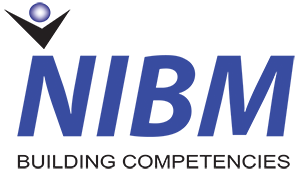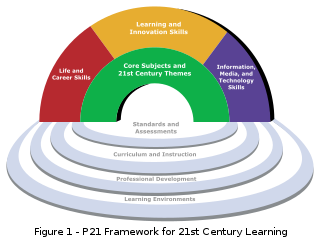
Vocational education is education that prepares people for a skilled craft as an artisan, trade as a tradesperson, or work as a technician. Vocational education can also be seen as that type of education given to an individual to prepare that individual to be gainfully employed or self employed with requisite skill. Vocational education is known by a variety of names, depending on the country concerned, including career and technical education, or acronyms such as TVET and TAFE.
The digital divide is the unequal access to digital technology, including smartphones, tablets, laptops, and the internet. The digital divide creates a division and inequality around access to information and resources. In the Information Age in which information and communication technologies (ICTs) have eclipsed manufacturing technologies as the basis for world economies and social connectivity, people without access to the Internet and other ICTs are at a socio-economic disadvantage, for they are unable or less able to find and apply for jobs, shop and learn.
Information and communications technology (ICT) is an extensional term for information technology (IT) that stresses the role of unified communications and the integration of telecommunications and computers, as well as necessary enterprise software, middleware, storage and audiovisual, that enable users to access, store, transmit, understand and manipulate information.

Technology education or tech ed is the study of technology, in which students "learn about the processes and knowledge related to technology". As a field of study, it covers the human's ability to shape and change the physical world to meet needs, by manipulating materials and tools with techniques. It addresses the disconnect between wide usage and the lack of knowledge about technical components of technologies used and how to fix them. This emergent discipline seeks to contribute to the learners' overall scientific and technological literacy, and technacy.

The National Institute of Business Management also known as NIBM, is a public business school based in Colombo, Sri Lanka.
OCR Nationals are vocationally related qualifications which were officially launched by the OCR Board in September 2004. The qualifications are designed to meet the needs of those seeking vocational education in place of the traditional, theory-intensive, academic route. Although the target audience are teenagers (14-19), the qualifications are also suitable for adult learners, much like the GNVQ. The OCR Nationals are being phased out, and replaced by the Cambridge Nationals.

Digital literacy is an individual's ability to find, evaluate, and communicate information using typing or digital media platforms. It is a combination of both technical and cognitive abilities in using information and communication technologies to create, evaluate, and share information.
The following outline is provided as an overview of and topical guide to information technology:

Information and media literacy (IML) enables people to show and make informed judgments as users of information and media, as well as to become skillful creators and producers of information and media messages. IML is a combination of information literacy and media literacy. The transformative nature of IML includes creative works and creating new knowledge; to publish and collaborate responsibly requires ethical, cultural and social understanding.

The Institute of IT Professionals (IITP) is a non-profit incorporated society in New Zealand. As New Zealand's ICT professional body, the IITP exists to promote education and ensure a high level of professional practice amongst ICT professionals. Before July 2012, IITP was known as the New Zealand Computer Society Inc (NZCS).
Design for All in the context of information and communications technology (ICT) is the conscious and systematic effort to proactively apply principles, methods and tools to promote universal design in computer-related technologies, including Internet-based technologies, thus avoiding the need for a posteriori adaptations, or specialised design.
The Global e-Schools and Communities Initiative is an international not-for-profit organisation providing demand-driven assistance to developing countries seeking to harness the potential of Information and Communication Technologies (ICT) to improve their education systems.

The Estonian Information Technology College (EITC) was a private non-profit institution of professional higher education in Estonia, located in Tallinn. EITC provided Estonian applied higher education diploma-level education in information technology in four main programmes, carried out shorter-term vocational training programmes as well as various R&D-oriented activities. In 2017 it merged with the Tallinn University of Technology.

Quinn Sutton is an American business professional. He is the Executive Director of the Digital Alliance Foundation and is known for his work in the private technology education sector and his work on a variety of UN-related and humanitarian projects. In 2007, he co-founded the Digital Alliance Foundation which provides capacity-building Information and Communications Technologies (ICT) skills to marginalized populations and serves as a High-Level Advisor for the Global Alliance for Information and Communication Technologies and Development (UNGAID).
The European Information Technologies Certification (EITC) programme is an international professional ICT knowledge and skills certification standard. It is developed and governed by the EITCI Institute, a non-profit organization based in Brussels that provides certification of individuals' knowledge and skills in narrow, specialized single-subject areas of ICT such as office software, computer-aided project management, online collaboration systems, and raster graphics processing.
European Information Technologies Certification Academy (EITCA) programme is an international professional ICT knowledge and skills certification standard, developed and governed by the EITCI Institute – a non-profit organization based in Brussels, that provides certification of individuals' knowledge and skills in broad field-oriented areas of ICT expertise such as Computer graphics, Information security etc. The EITCA programmes, referred to as EITCA Academies, include selected sets of several to over a dozen of individual EITC programmes, that together comprise a particular area of qualifications.

21st century skills comprise skills, abilities, and learning dispositions that have been identified as being required for success in 21st century society and workplaces by educators, business leaders, academics, and governmental agencies. This is part of a growing international movement focusing on the skills required for students to master in preparation for success in a rapidly changing, digital society. Many of these skills are also associated with deeper learning, which is based on mastering skills such as analytic reasoning, complex problem solving, and teamwork. These skills differ from traditional academic skills in that they are not primarily content knowledge-based.
The Bangladesh Computer Council (BCC) is a statutory government organization operating under the Information and Communication Technology Division of the Ministry of Posts, Telecommunications, and Information Technology of the Government of Bangladesh (GoB). Its headquarters are situated in Agargaon, Dhaka, Bangladesh. It was initially known as the National Computer Committee (NCC) in 1983 and transformed into the Bangladesh Computer Council through Act No. 9 of the National Parliament in 1990.
Educational technology in sub-Saharan Africa refers to the promotion, development and use of information and communication technologies (ICT), m-learning, media, and other technological tools to improve aspects of education in sub-Saharan Africa. Since the 1960s, various information and communication technologies have aroused strong interest in sub-Saharan Africa as a way of increasing access to education, and enhancing its quality and fairness.









